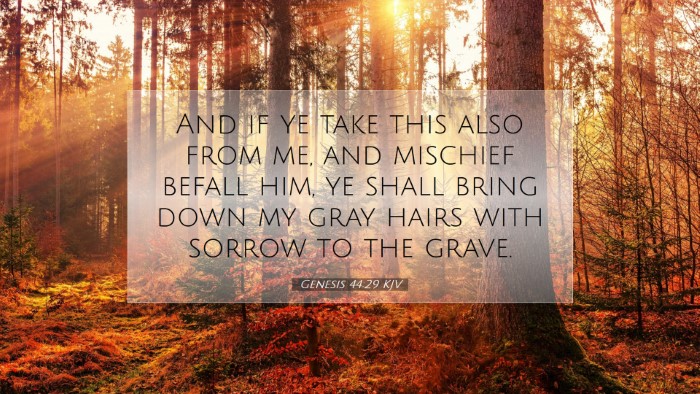Commentary on Genesis 44:29
Genesis 44:29 states: "And if you take this one also from me, and harm befalls him, you will bring down my gray hairs with sorrow to Sheol." This verse features Jacob's profound emotional plea, encapsulating his fears and the weight of his familial relationships. Below is a synthesis of insights from notable public domain commentators.
Context of the Verse
This verse is situated within the narrative of Joseph and his brothers during their second journey to Egypt. After the brothers return home, they must confront the possibility of losing another son, Benjamin, as Joseph, who has not yet revealed his identity, asks for him to stay as a servant instead of Simeon.
Thematic Elements
- Parental Love and Anxiety: Jacob's expression highlights the profound connection and anxiety parents feel regarding the safety of their children. His lamentation points to a deep-seated relational dynamic that underscores the emotional fabric of familial ties.
- The Idea of Loss: The fear of losing Benjamin echoes the grief he experienced over Joseph's presumed death. The emotional turmoil encapsulated in this moment reveals how past experiences color present relationships.
Commentary Insights
Matthew Henry's Commentary
Matthew Henry asserts that Jacob's words are a revelation of his heart, emphasizing the depth of a parent's love. He observes:
"Jacob here deals with a spirit of great anguish. He feels as if he cannot bear to face further loss."
Henry elaborates on the personal tragedy Jacob has faced and how it has led to a heightened sense of vulnerability regarding the future of his remaining sons.
Albert Barnes' Notes on the Bible
Albert Barnes stresses the psychological and sociological implications of Jacob's statement. Barnes notes:
"The fear of being bereaved again from one of his children—one he holds dear amplifies the pain he has already suffered."
Barnes furthers his commentary by discussing how Jacob’s reference to the gray hairs illustrates the aging process and how sorrow accelerates one's decline. This imagery evokes sympathy and highlights the emotional cost of loss.
Adam Clarke's Commentary
Adam Clarke provides detailed insights into the Hebrew context of "bring down my gray hairs." He notes:
"This is a metaphorical expression indicating that sorrow and anxiety contribute significantly to the aging process."
Clarke emphasizes the gravity of the situation for Jacob and depicts his reliance on his remaining sons for emotional stability. Clarke also suggests that Jacob’s response reflects the despair of a man weighted down by the cumulative sorrow of loss.
Theological Reflections
This verse serves as a poignant reminder of the impact of tragedy on human relationships. Theologically, Jacob's despair can be examined through several lenses:
- The Sovereignty of God: Despite Jacob’s fears and the apparent chaos, God’s overarching plan for the nation of Israel, as embodied in the story, remains intact.
- Human Suffering: Jacob’s anguish articulates the universal experience of suffering, inviting theological reflection on the nature of grief and God’s presence in our despair.
- Restoration and Reconciliation: This moment points to the eventual reconciliation between Jacob and Joseph, symbolizing themes of redemption and healing within broken relationships.
Conclusion
Genesis 44:29 is a fertile ground for discussing the emotional and spiritual ramifications of loss, fear, and parental love. The insightful observations from esteemed commentaries convey the timeless human experience explored through Scripture. For pastors, students, theologians, and Bible scholars, this verse can serve as a springboard for deeper exploration of grief, familial relationships, and God’s redemptive narrative.


